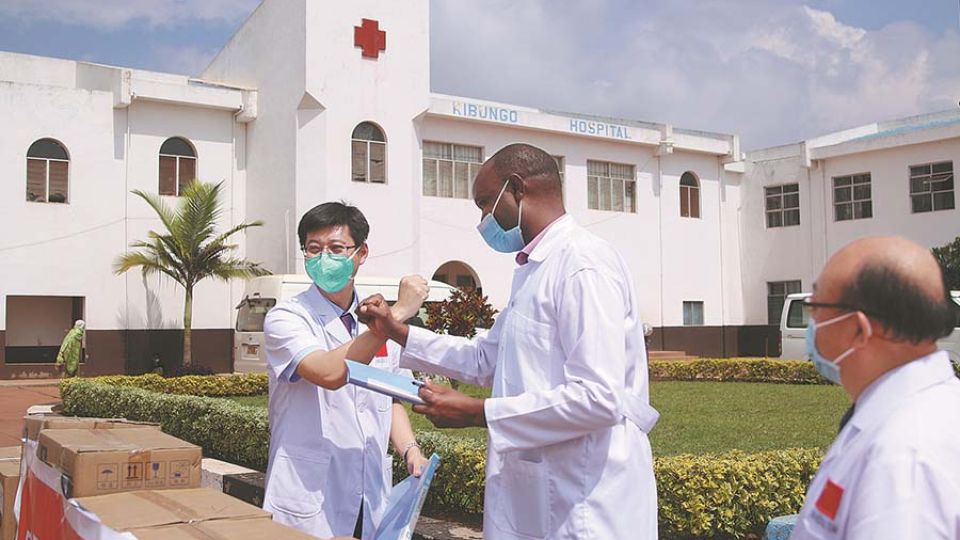November 2, 2022
BEIJING – Cooperation with China on health has played an important role in improving Africa’s response to the COVID-19 pandemic, and more people in the continent will benefit from closer bilateral cooperation, African scholars said.
Peter Kagwanja, chief executive at Kenyan think tank Africa Policy Institute, said with the resurgence of isolationism, protectionism and shrinking investment resources from Africa’s traditional partners in the West, cooperation with China offers a common response and recovery strategy for African countries to combat COVID-19 while promoting manufacturing to reduce poverty, provide jobs and rescue livelihoods.
Kagwanja noted that since the pandemic struck in 2020, Beijing has collaborated with African countries to fight COVID-19, with Africa and China collectively waging two wars.
“The first is the war to contain the spread of the virus. The other is the war against poverty that would come from succumbing to the disease either as a health threat or as an economic threat,” Kagwanja said.
He added that the pandemic has brought to the fore the need to enhance China-Africa cooperation in the research and production of vaccines, create cooperation among African and Chinese medical institutions, and promote public-private partnerships in the manufacturing of personal protective equipment and drugs.
“There is also a need to increase access to advanced medical technology. On this, China has stepped up medical cooperation with its government, private corporations, individuals and charities sharing vaccine development knowledge, medicine and ventilators as well as sharing experiences and technical skills with African counterparts,” Kagwanja said.
Since the pandemic began, efforts to increase Africa’s capacity in vaccine production have been stepped up. In Algeria’s Constantine Province, a production line started manufacturing COVID-19 vaccines last year, the result of a joint venture between China’s Sinovac Biotech and Algerian pharmaceutical group Saidal.
In June, Egyptian President Abdel Fattah al-Sisi pledged to provide 30 million COVID-19 vaccine doses to African states in coordination with the African Union. This was made possible after Egypt’s state-owned vaccine producer VACSERA started to jointly manufacture Sinovac COVID-19 vaccines last year, with a plan to become a regional center for vaccine production, storage and export in Africa.
In September, the collaboration went a step further after a China-aided automated and refrigerated vaccine storage complex with a capacity of up to 150 million doses was put into operation in Egypt, providing a major boost to the country and Africa’s vaccine supply chain.
Kagwanja said China’s support for Africa’s health sector goes beyond new technologies from vaccine production to the restoration of Africa’s traditional medicine knowledge as a way to fight diseases on the continent.
“Within African communities, there is a need for traditional therapies and medicine to create the immunity of countries or regions. We need to support local innovations in medical treatment and response to epidemics and enhance the sharing of knowledge on foods, teas, herbs and other consumables for immunity,” Kagwanja said.
Action plan
An action plan adopted by China and a number of African countries in 2002 for the cooperation and development of traditional medicine in Africa is an important platform for developing African traditional medicine.
The action plan, which was adopted by consensus during the first China-Africa Forum on Traditional Medicine convened in October 2002 in Beijing, covered human capacity building, intellectual property rights related to traditional medicine, research and development activities, commercial production and trade-related issues.
China-Africa cooperation in health is expected to only grow stronger, as can be seen in the construction of the China-aided headquarters of the Africa Centers for Disease Control and Prevention in Ethiopia, which is fast approaching completion. The project’s swift progress has won acclaim, while igniting people’s hopes in transforming public health in Africa.
In an interview with Xinhua News Agency, Fantahun Hailemichael, coordinator of the Africa CDC headquarters project at the African Union, said the project, covering 90,000 square meters with a total construction area of nearly 40,000 square meters, will be equipped with modern office buildings, high-end laboratories and the latest technological equipment.
“This project is envisioned to improve the public health service in Africa, particularly in terms of boosting Africa’s capabilities in controlling and managing infectious diseases,” Hailemichael said. “African countries in particular and the continent in general do not have adequate capacity, which has been evident in the advent of the ongoing COVID-19 pandemic that wreaked havoc on a global level.”
OTIATO OPALI in Nairobi, Kenya


